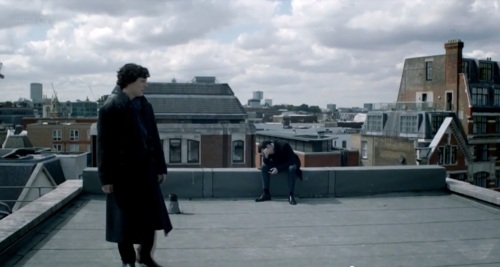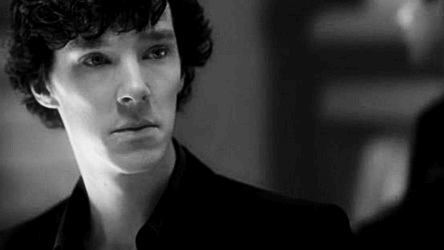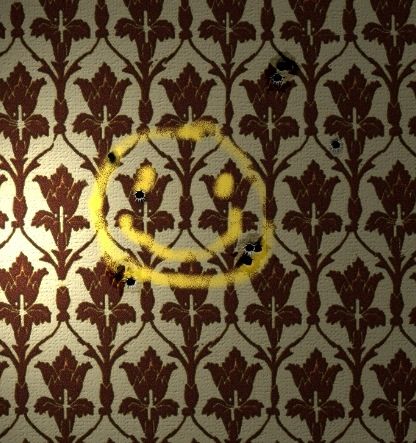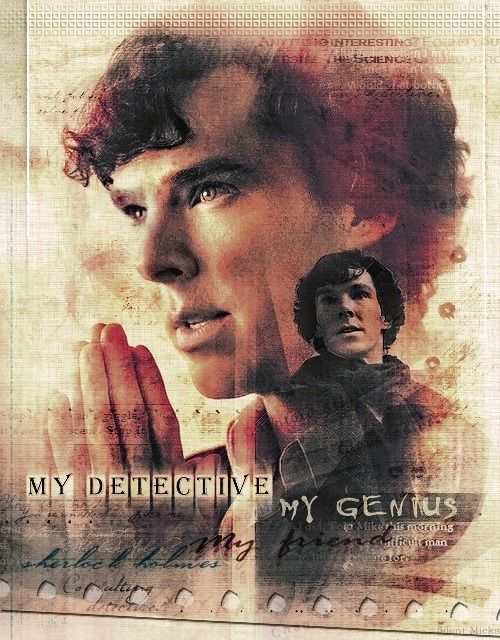
BBC Sherlock Fan Forum - Serving Sherlockians since February 2012.
- nakahara
- Threatened Knighthood
 Offline
Offline 
- Registered: February 22, 2014
- Posts: 11,979
Re: The Abominable Bride (for those who have seen it)
ukaunz wrote:
His use of meditation techniques could simply be derived from the canon. In The Adventure of the Empty House Watson tells us that Holmes spent time in Tibet. From the Baker Street Wikia:
After his defeat of Professor Moriarty, Sherlock Holmes decided to fake his own death in order to get away from the men pursuing him, and so decided to flee Europe. During this period he spent two years in Tibet under the guise of a Norwegian explorer named Sigerson. This included some time living in Lhasa, where he spent several days with the head Lama himself.
He then explains that he spent the next three years travelling to various parts of the world. Holmes says that initially, he travelled to Florence. From there, Holmes travelled to Tibet and wandered for two years, even attaining entry to Lhasa. Afterward, Holmes travelled incognito as a Norwegian explorer named Sigerson. Then, he went to Persia, with Holmes entering Mecca and then to a brief stopover in Khartoum.
Sounds like he was actually quite interested in spiritualism to some extent.
Very good find, ukaunz. Holmes definitely has interest in Oriental spirituality.
-----------------------------------
I cannot live without brainwork. What else is there to live for? Stand at the window there. Was there ever such a dreary, dismal, unprofitable world? See how the yellow fog swirls down the street and drifts across the dun-coloured houses. What could be more hopelessly prosaic and material? What is the use of having powers, Doctor, when one has no field upon which to exert them?

- nakahara
- Threatened Knighthood
 Offline
Offline 
- Registered: February 22, 2014
- Posts: 11,979
Re: The Abominable Bride (for those who have seen it)
Bruce Cook wrote:
____________________________________
Here's a fascinating question I just posted in another thread.
Why did Jim really shoot himself?
His stated reason is bogus — to prevent Sherlock from forcing him to call off the snipers. He told Sherlock that nothing would stop them other than seeing Sherlock jump. Jim just smiled and went along with Sherlock's tough talk about how he would be happy to "shake hands with you in hell", but we all know that's all it was. Tough talk.
Moriarty was more than capable of holding out long enough for the snipers to pass the time limit they must have been given before killing their three targets.
Therefore, there was really no reason for Moriarty to commit suicide — real or faked.
So . . . why did he do it?
To me, Moriarty looked absolutely world-weary at the end of TRF. Look at his body-language:
This is the pose of a defeated man.
Moriarty´s active brain needed Sherlock to distract itself, it needed their constant mind-games and their mutual battle... and yet in TRF, Sherlock was seemingly destroyed by Moriarty´s cunningness.
And in destroying Sherlock, the world of incredible boredom and pointless mundanity opens in front of him anew.
In getting rid of the detective, he cut the meaning of his own life from himself.
He even comments on it, how pointless everyting seems to him during a scene.
So I would not put it past him that he planned to committ suicide immediatelly after Sherlock killed himself.
Killing himself to actually force Sherlock to jump would seem even more exciting to him, an ultimate joke on a detective´s expense.
By not offering resistance to him, by openly submitting to him Sherlock drove him into suicide and thus won, IMHO. Some battles are won by a retreat, not by a fierce attack....
-----------------------------------
I cannot live without brainwork. What else is there to live for? Stand at the window there. Was there ever such a dreary, dismal, unprofitable world? See how the yellow fog swirls down the street and drifts across the dun-coloured houses. What could be more hopelessly prosaic and material? What is the use of having powers, Doctor, when one has no field upon which to exert them?

- Mothonthemantel
- British Government
 Offline
Offline 
- From: Wales.
- Registered: January 4, 2016
- Posts: 609
Re: The Abominable Bride (for those who have seen it)
I think Moriarty was dieing anyway just like the ghost bride. Maybe he knew that and thats why his ring tone was staying alive or maybe arsenic in the soup , or do I mean tea , or did he take a bite from Sherlocks poisoned apple and seek redemption or revenge by way of taking Sherlock down with him.
Last edited by Mothonthemantel (January 8, 2016 3:28 pm)
"Man may not be degraded to being a machine by being denied to be a ghost in the machine."
It's just transport. The virus in the hard drive . However impossible .Must be the truth.
- besleybean
- Threatened Knighthood
 Offline
Offline 
- From: Carnoustie, Angus, Scotland.
- Registered: October 4, 2012
- Posts: 21,376
Re: The Abominable Bride (for those who have seen it)
Yes, I do wonder if there is a link with the bride dying anyway...
---------------------------------------------------------------------------------------------------------------------------------------------------------------
- ancientsgate
- Reichenbach Survivor
 Offline
Offline 
- From: New Hampshire, USA
- Registered: June 8, 2012
- Posts: 5,532
Re: The Abominable Bride (for those who have seen it)
Harriet wrote:
ancientsgate wrote:
If you act quickly, you can see it on repeat broadcast on PBS on Sunday the 10th at 10PM ET.
Thanks, ancientsgate! Seems to work for the US only, but there might still be quite some people who benefit from it.
Yes, it probably is US only, that's where she said she lived. Perhaps people with satellite TV in other countries can pick up on the PBS feed, not sure how that works.
- SusiGo
- The game is never over (moderator)
 Offline
Offline 
- From: Germany
- Registered: June 5, 2012
- Posts: 22,965
Re: The Abominable Bride (for those who have seen it)
Btw, what do we make of this?
[
------------------------------
"To fake the death of one sibling may be regarded as a misfortune; to fake the death of both looks like carelessness." Oscar Wilde about Mycroft Holmes
"It is what it is says love." (Erich Fried)
“Enjoy the journey of life and not just the endgame. I’m also a great believer in treating others as you would like to be treated.” (Benedict Cumberbatch)

- •
- This Is The Phantom Lady
- Threatened Knighthood
 Offline
Offline 
- From: Home of Hamlet (Denmark)
- Registered: February 6, 2014
- Posts: 10,183
Re: The Abominable Bride (for those who have seen it)
Ah! that one has bugged me! Was that just an inside joke with himself, or did he spill something?
~~~~~~~~~~~~~~
"Don't talk out loud, you lower the IQ of the whole street!"

"Oh Watson. Nothing made me... I made me"
"Luuuuurve Ginger Nuts"
Tumblr[/url] I [url=]AO3
#IbelieveInSeries5
- SusiGo
- The game is never over (moderator)
 Offline
Offline 
- From: Germany
- Registered: June 5, 2012
- Posts: 22,965
Re: The Abominable Bride (for those who have seen it)
And strange parallel to HLV as well …
------------------------------
"To fake the death of one sibling may be regarded as a misfortune; to fake the death of both looks like carelessness." Oscar Wilde about Mycroft Holmes
"It is what it is says love." (Erich Fried)
“Enjoy the journey of life and not just the endgame. I’m also a great believer in treating others as you would like to be treated.” (Benedict Cumberbatch)

- •
- besleybean
- Threatened Knighthood
 Offline
Offline 
- From: Carnoustie, Angus, Scotland.
- Registered: October 4, 2012
- Posts: 21,376
Re: The Abominable Bride (for those who have seen it)
Presumably reacting to what Mycroft had told him.
---------------------------------------------------------------------------------------------------------------------------------------------------------------
- SusiGo
- The game is never over (moderator)
 Offline
Offline 
- From: Germany
- Registered: June 5, 2012
- Posts: 22,965
Re: The Abominable Bride (for those who have seen it)
No. This is the first thing Sherlock says after his Reichenbach jump when waking up in the plane.
------------------------------
"To fake the death of one sibling may be regarded as a misfortune; to fake the death of both looks like carelessness." Oscar Wilde about Mycroft Holmes
"It is what it is says love." (Erich Fried)
“Enjoy the journey of life and not just the endgame. I’m also a great believer in treating others as you would like to be treated.” (Benedict Cumberbatch)

- •
- besleybean
- Threatened Knighthood
 Offline
Offline 
- From: Carnoustie, Angus, Scotland.
- Registered: October 4, 2012
- Posts: 21,376
Re: The Abominable Bride (for those who have seen it)
I was nearly confused again!
Oh, the Falls, rather than the rooftop.
Though this may indicate he was drugged(or at least hallucinating) precisely in that 5 mins post Mycroft's phone call.
---------------------------------------------------------------------------------------------------------------------------------------------------------------
- stoertebeker
- British Government
 Offline
Offline 
- From: Germany, Hamburg
- Registered: April 24, 2013
- Posts: 777
Re: The Abominable Bride (for those who have seen it)
Bruce Cook wrote:
Here's a fascinating question I just posted in another thread.
Why did Jim really shoot himself?
His stated reason is bogus[/size] — [size=125]to prevent Sherlock from forcing him to call off the snipers. He told Sherlock that nothing would stop them other than seeing Sherlock jump. Jim just smiled and went along with Sherlock's tough talk about how he would be happy to "shake hands with you in hell", but we all know that's all it was. Tough talk.
Moriarty was more than capable of holding out long enough for the snipers to pass the time limit they must have been given before killing their three targets.
Therefore, there was really no reason for Moriarty to commit suicide real or faked.
So . . . why did he do it?
I think because Sherlock was his last real opponent, the last challenge he had to face. I mean, Moriarty was obviously very sucessful in his criminal career. He has an awful lot of money (the painting in TGG) and after his coup with the crown juwels and the verdict of not guilty every baddie in the world had wanted him (he said so in his conversation with Sherlock in Baker Street in TRF). So what challenge, what goal was there left for him? He achieved everything in the criminal world and he would have been able to get everything he wanted. So, beating Sherlock was his last ultimate goal. And to make sure that he would be the winner, that he had truly beaten his only rival (Mycroft's words) he had to kill himself. There was just nothing interessting left in his life to keep going.
Jesus, now I am almost convinced that Moriarty IS dead ![]() .
.
---------------------------------------------------------------------------------------------------------
"There is a place for people like you, the desperate, the terrified. The ones with nowhere else to run."
"What place?"
"221B Baker Street."
- Lilythiell
- High Functioning Sociopath
 Offline
Offline 
- From: France
- Registered: May 11, 2014
- Posts: 2,371
Re: The Abominable Bride (for those who have seen it)
I am not sure where to post this, but here is the Tarmac scene, extended with STAB scenes.
Prepare tissues.
-------------------------------------------------------------------------
I'd be lost without my blogger.
"It’s not a ‘gang’ show, it’s the Sherlock and John show. It’s about developing their characters and their relationship, and the characters drawn into their orbit.” Steven Moffat

- RavenMorganLeigh
- Official Blogger
 Offline
Offline 
- From: Seattle, WA, USA
- Registered: December 25, 2013
- Posts: 1,575
Re: The Abominable Bride (for those who have seen it)
Ivy wrote:
The wonderful Ariane has finished her TAB transcript
EDIT: that "protective John" bit is brilliant.
(((((YES!!!!!!!!!!))))))
Bless her!
- This Is The Phantom Lady
- Threatened Knighthood
 Offline
Offline 
- From: Home of Hamlet (Denmark)
- Registered: February 6, 2014
- Posts: 10,183
Re: The Abominable Bride (for those who have seen it)
Thank you Lily, now that's one way to start off your day in tears.
But it's actually an interesting insight to see it comprised like that, thank you!
~~~~~~~~~~~~~~
"Don't talk out loud, you lower the IQ of the whole street!"

"Oh Watson. Nothing made me... I made me"
"Luuuuurve Ginger Nuts"
Tumblr[/url] I [url=]AO3
#IbelieveInSeries5
- Liberty
- Moderator
 Offline
Offline 
- Registered: June 29, 2014
- Posts: 5,983
Re: The Abominable Bride (for those who have seen it)
Agreed, really good idea to put it all together.
The ending of HLV is so sad (thank goodness they had the little epilogue!). I still don't think Sherlock seems to be out of it on the tarmac, acting or not, or even at the time he takes the phone call. Although obviously, it would have to be hidden enough to hide it from us, the audience, too! And it's very hard to believe that he's in on a plot to bring him back - it looks like he really believes he's going off to almost certain death. It also does seem as if the two plane scenes go together.
- Liberty
- Moderator
 Offline
Offline 
- Registered: June 29, 2014
- Posts: 5,983
Re: The Abominable Bride (for those who have seen it)
The "Miss me?" above - I'm not sure if I'm misunderstanding the question - it's obviously a reference to what Moriarty says - but are you asking how Sherlock could have heard it? I don't know. He's not actually in his mind palace there (where the things people have said seep into his mind and are repeated), so he doesn't need to have heard Moriarty say it. Maybe he's just innocently saying it because he has been off in his mind palace, and the Moriarty reference is for us. Or maybe Mycroft told him or sent him something about Moriarty saying "Did you miss me?" and that was in his mind. But it's a good point - the other "quotes" tend to be things that Sherlock has heard directly.
- besleybean
- Threatened Knighthood
 Offline
Offline 
- From: Carnoustie, Angus, Scotland.
- Registered: October 4, 2012
- Posts: 21,376
Re: The Abominable Bride (for those who have seen it)
I can only repeat Sherlock's response must be because his thoughts are shown post Mycroft's phone call, when he was told about the 'miss me'.
---------------------------------------------------------------------------------------------------------------------------------------------------------------
- Liberty
- Moderator
 Offline
Offline 
- Registered: June 29, 2014
- Posts: 5,983
Re: The Abominable Bride (for those who have seen it)
Yes, it's probably too easily explained away to be a definite clue that he knew something.
- ukaunz
- High Functioning Sociopath
 Offline
Offline 
- From: Australia
- Registered: February 13, 2015
- Posts: 2,584
Re: The Abominable Bride (for those who have seen it)
I'm watching STAB for my second time tonight with my husband, who hasn't seen it yet. Fingers crossed he will like it!
----------------------------------------------------------------------------------------------------------------------------------------------------



